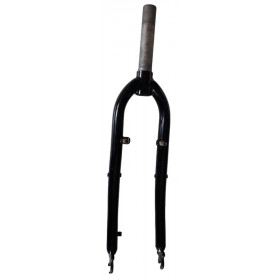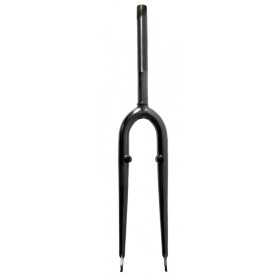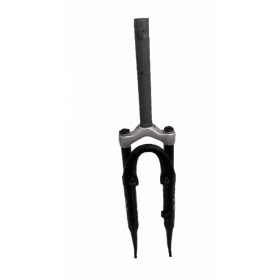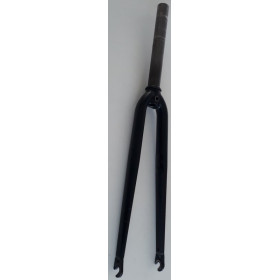-
 New productRigid fork 26 inches steel threaded
New productRigid fork 26 inches steel threaded- €48.99
-
 New product26 inch rigid chrome v-brake mountain bike fork
New product26 inch rigid chrome v-brake mountain bike fork- €48.99
-
 UsedRock Shox Ruby Metro fork
UsedRock Shox Ruby Metro fork- €14.99
-
 UsedStraight fork Extra+ fixie used
UsedStraight fork Extra+ fixie used- €29.99
Showing 1-4 of 4 item(s)
The fork of a touring bike plays a vital role in the bike's overall performance, especially when traveling long distances over a variety of terrain. Here are the main functions and characteristics of a touring bike fork:
1. Construction material:
Touring bike forks can be made from different materials, such as steel, aluminum, carbon or titanium. Each material has its advantages in terms of weight, rigidity and vibration absorption.
2. Shock absorption:
Some fork models feature shock absorption systems to improve rider comfort over rough terrain. This may include technologies such as integrated shock absorbers, flexible lower legs or suspension systems.
3. Mudguards and bottle cages:
Some models of touring forks are designed with eyelets or attachments allowing the installation of mudguards. This is useful in protecting the rider from splashing water and mud. Some models also include bottle cage mounts, providing additional space for carrying water or other gear.
4. Adapted geometry:
The fork geometry can be designed to accommodate wider tires, providing better grip on varied surfaces, including dirt roads and trails.
5. Compatibility with braking systems:
Touring bike forks are often compatible with different types of braking systems, such as disc brakes or rim brakes, allowing the rider to choose the type of brake that best suits their needs.
6. Through-axle:
Some models of touring bike forks are equipped with a thru axle, providing greater rigidity and stability, especially on difficult terrain.
7. Luggage rack mounts:
Some forks are equipped with eyelets or mounts to facilitate the installation of front racks. This allows the rider to carry additional loads for multi-day trips.
8. Ground clearance:
The fork design can also be adjusted to provide adequate ground clearance, which is especially important when riding on trails or unpaved roads.
In summary, a touring bike fork is designed to provide a comfortable, stable, and versatile ride over a variety of terrains. Specific features depend on the rider's needs, the type of terrain they plan to ride on, and the load they plan to carry.
